Vegan Globetrotter is supported by our audience. When you purchase through one of our links, we may earn a small affiliate commission. As an Amazon Associate I earn from qualifying purchases. Your cost is not affected.
==================
Mung Bean Sprout Nutrition Is Healthy
Mung bean sprout nutrition makes people healthier and doesn’t take much time and effort to prepare. It’s because sprouting can be quite easy and useful when done right. Eating these sprouts isn’t only tasty. Germinated seeds deliver plenty of health benefits too. So, with these vegetables, folks get a lot of bite-sized goodness.
Besides, having these sprouts can give different experiences compared to eating mung beans. The seeds with stems have a soft texture and a nutty taste. When mixed with other food items, they often absorb the flavors. Thus, they can provide crunchy and juicy attributes to dishes.
So, are mung bean sprouts healthy? Yes, and we will explore why that is so. Also included are bean sprouting tips and more.
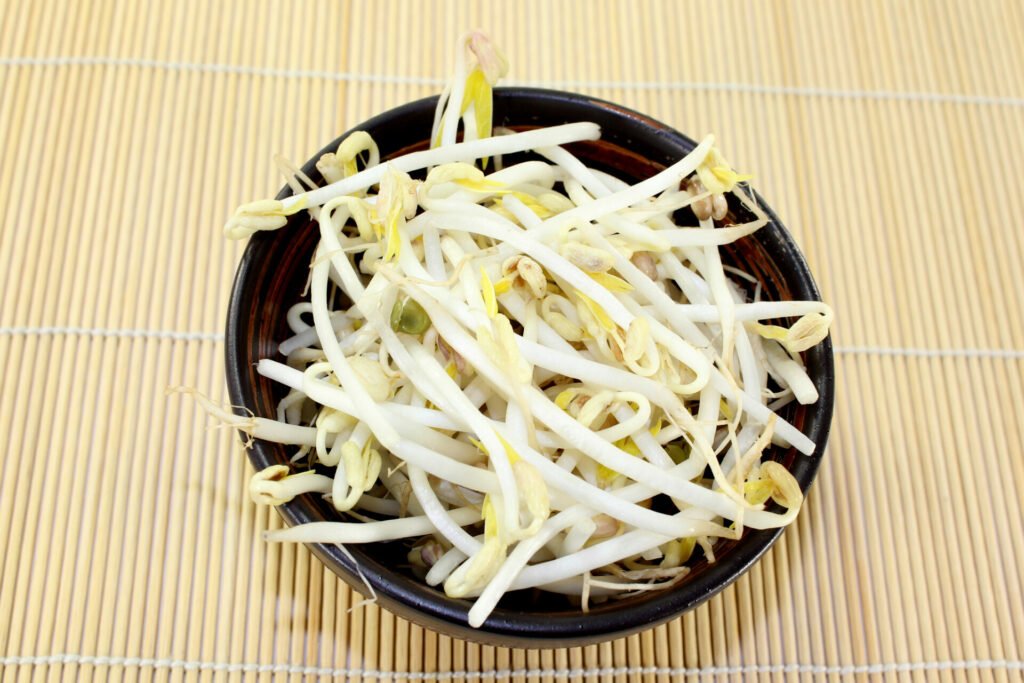
What Nutrients Can Bean Sprout Provide
In a nutshell, science has proven mung bean sprouts to be very nutritious. They contain various substances and nutrients like antioxidants, vitamins, and minerals. These can help take care of and enhance the human body. Thus, it’s no wonder why it’s a regular activity for people around the globe to do bean sprouting. With what they can supply to the body, they are worth growing.
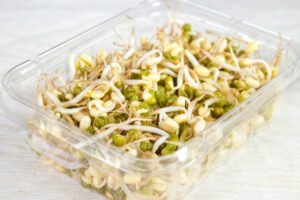
Why are mung bean sprouts healthy? Unlike poultry foods, beef, and pork, mung bean sprouts are free of cholesterol. They deliver reasonable amounts of protein, potassium, fiber, and copper. These sprouts also have low sodium content and calories. So they are excellent for weight management and health maintenance.
Sprouting and Eating Mung Beans Can Give
-
Antioxidants that counteract oxidation within the body. They are from the polyphenols, polysaccharides, polypeptides, and proteins of the sprouts. Examples of the said polyphenols are phenolic acids and flavonoids. There’s also caffeic acid to have. These are great for fighting inflammation and even preventing cancer growth.
-
Biocides like “Mungin” control harmful microorganisms. These are from the peptides, polyphenols, and enzymes of the mung beans. These can assist in beating bacteria, fungi, and other pathogens within the body by way of food.
-
Vitamins and minerals. People pursue mung bean sprout nutrition because of what the seedlings can provide. Examples are vitamin C and K, folate, and iron. All these have antioxidant activities with their respective beneficial functions. For a brief explanation, they are good for cellular growth and repair. So they can help in preserving the white and red blood cell count and activities.
-
Plenty of macronutrients. They have fair amounts of calories, carbs, fibers, sugars, and proteins. That is when mung bean sprouts are compared with others such as the alfalfa and broccoli sprouts.
Why Are Mung Bean Sprouts Healthy
Given the mentioned substances and nutrients from the sprouts, they are nutritious. They can deal with all sorts of weakness, swelling, infection, and nutrient deficiency. But what’s great about them is that they are also healthier as compared with other food items. They might not be the best in everything yet they offer plenty to gain from. So, people from different corners of the world and all walks of life include them in their diet.
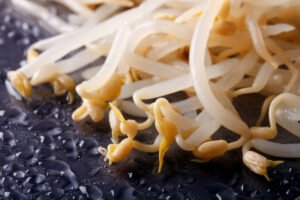
Mung Bean Versus Mung Bean Sprouts
Compared with whole mung beans, bean sprouts have fewer calories. In 100 grams of both, the former delivers more or less 300 calories. The latter delivers about 30 only. This doesn’t mean that mung bean sprout nutrition is lesser. Rather, it only implies that taking in bean sprouts may help in weight loss.
With the same amount, there are also more macronutrients in mung beans. With them, there is around 4.58 oz. (130 grams) or 70% of carbs, 0.084 oz. (2.4 grams) or 3% of fat, and 1.72 oz. (49 grams) or 27% of protein. Mung bean sprouts deliver 0.225 oz. (6.4 grams) or 63% of carbs, 0.007 oz. (0.2 grams) or 5% of fat, and 0.112 oz. (3.2 grams) or 33% of protein. Although they have similar amounts of sugar, their fiber, protein, and fat differ. Also, mung beans have more vitamin and mineral content. Yet this doesn’t mean it would be ideal to favor one over the other. Rather, take one after another to have the best of both. It isn’t wise to have either always In short, they are about equal in usefulness despite their difference.
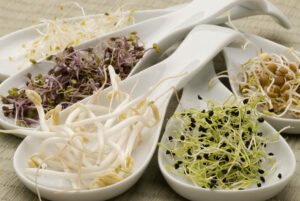
Assorted sprouts in white serving spoons
Mung Bean Sprouts Versus Other Sprouts
With mung bean sprout nutrition, you have more macronutrients for the most part. That is because mung beans and sprouted ones are usually dense when it comes to nutrients. If you get 31 calories from mung bean sprouts, you only get 8 for alfalfa and 20 for broccoli and other sprouts. Plus, with them, people get more carbs, sugars, and protein. They may not supply plenty of saturated fat but that’s what’s good about them. Are mung bean sprouts healthy that way? Yes, because they lower cholesterol levels better. So, with them, you get food that packs a lot.
Sprouting For Mung Bean Sprout Nutrition
Bean sprouts are available year-round in most grocery stores. Since there is a variety of beans and it is easy to grow them, they are very accessible. Yet it’s also possible to grow them within one’s property too. For this option, among things needed are clean water, containers, and strainers. Of course, space is also required to keep them warm yet away from sunlight. Thus it isn’t hard to grow them on your own.

It’s easy to follow bean sprouting tips. You only need materials to soak the mung beans for 12 hours at first and then drain them with ease after. Then rinsing them once daily is enough to see them grow in 2 to 5 days. But if you’re asking, “Why are my bean sprouts bitter?” it must be because sunlight got to them while covered. The exposure may cause damage to the integrity of the plants and cause them to taste that way. So it is important that they only get indirect sunlight.
There is a study in 2011 that says a certain gene in people may cause sprouts to taste bitter. If you’re wondering, “Why are my bean sprouts bitter?” this could be it. Yet this one isn’t conclusive. In most cases, the germinated seedlings that taste harsh are those that are not in good condition.
Consider These Bean Sprouting Tips
To do well in mung bean sprout nutrition, everything must be done right. This is so only clean and healthy sprouts get eaten. Take note that there have been many cases of contaminated sprouted seedlings. Eating these may lead to E. coli, Salmonella, and Listeria infection. Thus, food safety is a concern when it comes to sprouting beans. Yet, with proper handling, there should be nothing to worry about. Also, there is the option to cook the sprouted seedlings to get rid of bacteria and other pathogens.
Specific Mung Bean Sprouting Tips
-
Have clean water only. Aside from a bit of sunlight, it’s all the sprouts are going to absorb to grow. So make sure that only clean water gets to it.
-
Use the right tools. Use them right. Make sure that you have a reliable container or jar that you can use to seal and accommodate the beans. It has to maintain good ventilation and be usable for rinsing.
-
Keep rinsing and make sure to keep your container dry. There must be no standing water. The seedlings need rinsing every 6 to 12 hours depending on the weather. It’s every 6 hours when it’s warm.
-
Find a storage place. Store them right. Letting them stay where they can get 27 to 30 °C can help them grow. But they need to be dry before storage. So, after rinsing, let the air dry them first before keeping them in the right compartment or fridge.
-
Consume them within 1 week. That ensures they’re still fresh and safe to eat.
To wrap it all up…
Mung bean sprout nutrition is a worthy pursuit. That’s because of these germinated seedlings’ nutritive value. Growing them is so uncomplicated and sourcing them is a breeze. They come with a set of macronutrients that provides energy and repairs muscle tissues. LDL or bad cholesterol is also lowered. Plus, they have antioxidant and antimicrobial properties. They can combat free radicals and pathogens to prevent cell damage and diseases. No wonder, many have them as part of their diet.
They are not only healthy but very available too. Many companies and even homeowners grow them without difficulty. But, before eating some, make sure that only clean and fresh batches are there for consumption. They are prone to contamination and very vulnerable to damage. So, pick the right ones to eat and know how to store them properly.

Mung Bean Sprouts
Read On:
Amazing Benefits Of Mung Beans
Easy Meals: Asian Rice and Veggies
Mixed Vegetables With Air Fry Tofu
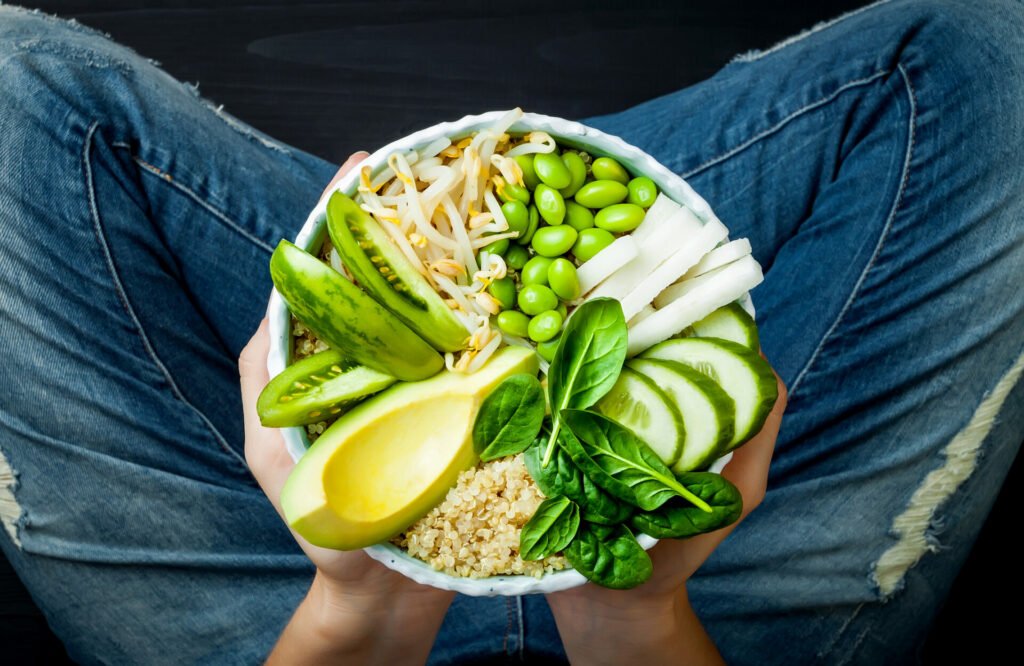



Don't miss out
when new recipes and information are added!
Join our newsletter for free recipes,
healthy living inspiration, and special offers
You have Successfully Subscribed!